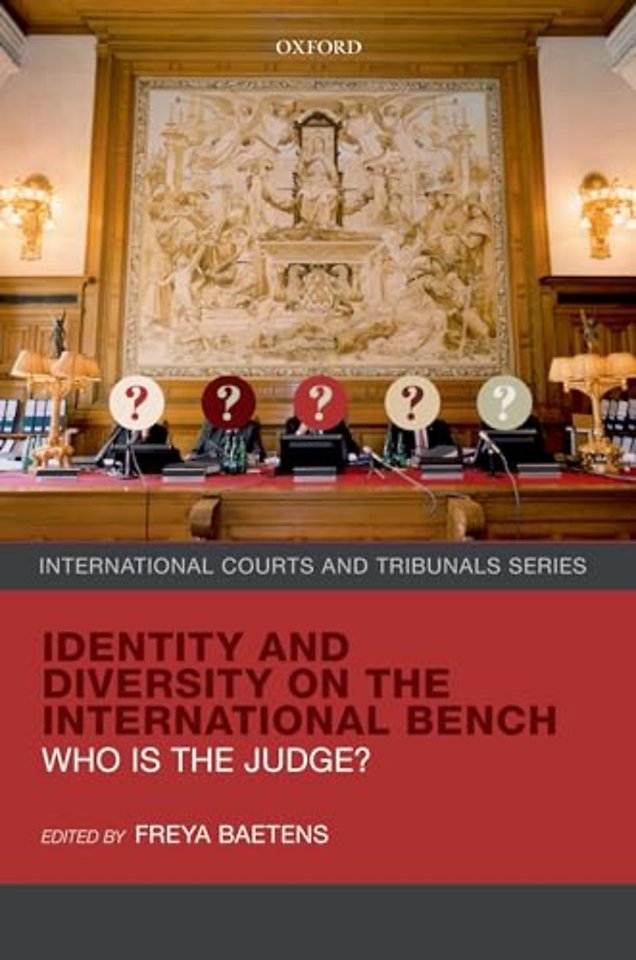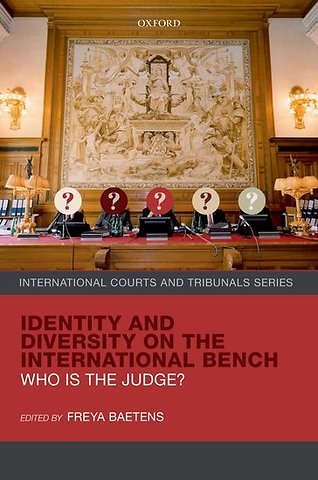Identity and Diversity on the International Bench
Who is the Judge?
Samenvatting
International courts and tribunals hold the power to decide on questions involving sovereignty over territory, grave human rights violations, international crimes, or millions of euros' worth of economic interests. Judges and arbitrators are the 'faces' and arguably the drivers of international adjudication. Yet certain groups tend to be overrepresented on international benches, while others remain underrepresented.
Although international courts and tribunals differ in their institutional make-up and functions, they all rely in essence on the judgement of a group of individuals, each with their own background and experience. Even if adjudicators' identity is not the only, and may not be the decisive, influence on their decision-making, the relative lack of diversity has an effect on the judicial process and its outcomes, which in turn entails broader implications for the legitimacy of international law.
This book analyses the implications of identity and diversity across numerous international adjudicatory bodies, focusing on a wide range of factors. Lack of diversity within the judiciary has been identified as a legitimacy concern in domestic settings, and the last few years have seen increasing attention to this question at the international level as well, making the book both timely and topical.
Specificaties
Inhoudsopgave
Navanethem Pillay
List of Abbreviations
List of Contributors
1. Identity and Diversity on the International Bench: Implications for the Legitimacy of International Adjudication
Freya Baetens
PART I: TOWARDS THE INTERNATIONAL BENCH
2. The Smurfette Principle: Reflections about Gender and the Nomination of Women to the International Bench
Liesbeth Lijnzaad
3. Generating Incentives to Appoint Women to the International Bench: Experiences with State Practice
Rolf Einar Fife
4. Justifications for the Promotion of Religious Diversity on the International Bench 60
David M Bigge
5. Judges Ad Hoc at the International Court of Justice: A Means for Enhancing Regional and Legal Systemic Diversity in the Composition of the Court?
Paolo Palchetti
6. The Party- Appointment Process: Addressing Barriers to Equal Opportunities for Women in the Appointment of Ad Hoc Adjudicators
Catherine Drummond
7. African Women's Paths to the International Bench: How to Overcome the Hurdles
Rebecca Emiene Badejogbin
8. Analysing Appointments in International Arbitration: Nationality, Ethnicity, Race, and Legal Training of Arbitrators
Monika Prusinowska
9. Legitimacy of Investor- State Arbitration: Addressing Development Bias Among International Arbitrators
Jamal Seifi
10. Fifty Years of Women at the European Court of Human Rights: Successes and Failures of the Council of Europe's Gender Agenda
Helen Keller, Corina Heri, and Myriam Christ
PART II: ON THE INTERNATIONAL BENCH
11. The Identity Conundrum: Legitimacy and Doubt on the International Bench
Catharine Titi
12. Judicial Education and International Courts: A Proposal Whose Time has Come?
SI Strong
13. Additional Opinions and Judicial Diversity at the International Court of Justice: A Research Methodology
Hemi Mistry
14. Citing Religious Texts in Individual Opinions to Judgments of the International Court of Justice: How Judges Incorporate Their Religious Identity in Judicial Decision- Making
Mubarak A Waseem
15. A Question of Impartiality: Who are the Dissenting Arbitrators in Investment Treaty Arbitration?
Szilárd Gáspár- Szilágyi and Laura Létourneau- Tremblay
16. Adjudicating International Trade Cases in the World Trade Organization: Does Gender Make a Difference?
Valerie Hughes
17. The Contribution of Women Judges and Prosecutors to the Development of International Criminal Law
Teresa Doherty
18. The Contribution of Female Judges to the Victim Jurisprudence of the International Criminal Court
Juan- Pablo Pérez- León- Acevedo
19. Judicial Legal Culture and Victim Procedural Status at the Special Tribunal for Lebanon and Extraordinary Chambers in the Courts of Cambodia
Juan- Pablo Pérez- León- Acevedo
20. Appearing Before and Sitting With Female Adjudicators: Reflections from Practice
James Crawford
PART III: BEYOND THE INTERNATIONAL BENCH
21. Diversity and Legitimacy of the World Trade Organization's Bench
Cosette D Creamer and Zuzanna Godzimirska
22. Ethnicity, Religion, and Diversity at the International Criminal Court: Is More Too Much?
Solomy Balungi Bossa and Gilles Landry Dossan
23. The Significance of Religious Diversity in International Human Rights Adjudication
Kristen Hessler
24. Diversity on the Bench of the European Court of Human Rights: A Clash of Paradigms
Angelika Nußberger and Freya Baetens
25. Peru's 'Intercultural Law' Proposal: Promoting Ethnic Diversity in the Administration of Justice
Clara María López Rodríguez
26. Keeping Gender on the Agenda for International Benches: A Case Study of the African Court on Human and Peoples' Rights
J Jarpa Dawuni
Epilogue Diversity, Inclusion, and Legitimacy in International Courts and Tribunals: Insights from Within, Perspectives from the Periphery— An Island Girl Speaks
Janet M Nosworthy
Index







